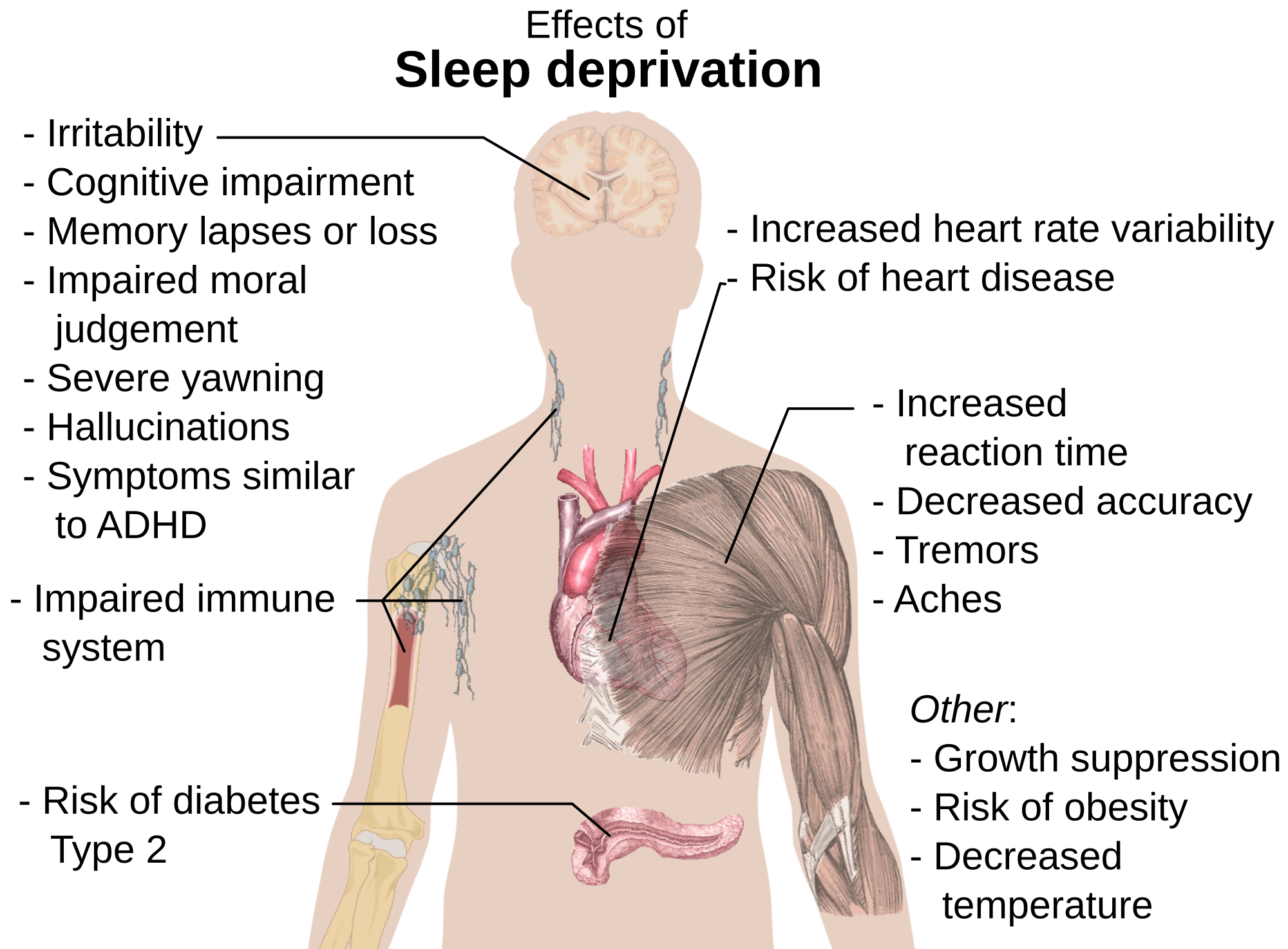Sleep deprivation (Part 1): Causes and Effects
Sleep deprivation is the condition of not having enough sleep ; it can be
either chronic or acute . A chronic sleep-restricted state can cause fatigue, daytime sleepiness, clumsiness and weight loss or weight gain.
either chronic or acute . A chronic sleep-restricted state can cause fatigue, daytime sleepiness, clumsiness and weight loss or weight gain.
Sleep deprivation may result in the following conditions:
 |
| wikimedia.org |
aching muscles
confusion, memory lapses or loss
depression
development of false memory
hallucinations
hand tremor
headaches
malaise
stye
periorbital puffiness , commonly known as. "bags under eyes" or eye bags
increased blood pressure
increased stress hormone levels
increased risk of diabetes
increased risk of +fibromyalgia
irritability
nystagmus (rapid involuntary rhythmic eye movement)
obesity
seizures
temper tantrums in children
yawning
mania
May cause symptoms similar to:
attention-deficit hyperactivity disorder (ADHD)
psychosis
attention-deficit hyperactivity disorder (ADHD)
psychosis
In a study at UCSD school of Medicine, sleep deprivation was seen to cause the brain to compensate when the individuals were asked to perform simple tasks. This means that the brain was working twice as hard in order to process simple daily tasks.
Extended sleep deprivation will inevitably result in microsleep.
Microsleeps occur when the brain automatically shuts down, falling into a sleep state for a period that can last from a fraction of a second up to half a minute.
The person falls asleep no matter what activity he or she is engaged in.
Microsleeps are similar to blackouts and a person experiencing them is not consciously aware that they are occurring.
Weight gain/ weight loss
In rats, prolonged, complete sleep deprivation increased both food intake and energy expenditure with a net effect of weight loss and ultimately death.
This study hypothesizes that the moderate chronic sleep debt associated with habitual short sleep is associated with increased appetite and energy expenditure with the equation tipped towards food intake rather than expenditure.
The findings suggest that this might be happening because sleep deprivation could be disrupting hormones that regulate glucose metabolism and appetite.
Causes of sleep deprivation:
♣ Insomnia
Many of its symptoms are easily recognizable, including
※ excessive daytime sleepiness ;
※ frustration or worry about sleep;
※ problems with attention, concentration, or memory;
※ extreme mood changes or irritability;
※ frustration or worry about sleep;
※ problems with attention, concentration, or memory;
※ extreme mood changes or irritability;
※ lack of energy or motivation;
※ poor performance at school or work;
※ tension headaches or stomach aches.
※ tension headaches or stomach aches.
♣ Voluntary sleep deprivation.
Sleep deprivation can sometimes be self-imposed due to a lack of desire to sleep or the habitual use of stimulant drugs.
Sleep deprivation is also self-imposed to achieve personal fame in the context of record-breaking stunts.
♣ Sleep apnea
Sleep apnea (obstructive sleep apnea) is a collapse of the upper airway during sleep, which reduces airflow to the lungs.
It has many serious health outcomes if untreated, but can very often be effectively treated with positive air pressure therapy.
Central sleep apnea is repeated stops in breathing during sleep when the brain temporarily stops sending signals to the muscles that control breathing.
♣ Mental illness/ bi-polar disorder
Shifts into mania in bipolar patients are often preceded by periods of insomnia, and sleep deprivation has been shown to induce a manic state in susceptible individuals.
Sleep deprivation may represent a
final common pathway in the genesis of mania, and sleep loss is both a precipitating and reinforcing factor for the manic state.
final common pathway in the genesis of mania, and sleep loss is both a precipitating and reinforcing factor for the manic state.
♣ School life:
Sleep deprivation is common in first year college students as they adjust to the stress and social activities of college life.
School schedules are often incompatible with a corresponding delay in sleep offset, leading to a less than optimal amount of sleep for the majority of adolescents.
♣ Work:
people who do shift work disrupt their sleep-wake cycles on a regular basis. Frequent travellers (for example, airline crew) also tend to have erratic sleeping patterns.
Suggestions on how to get more sleep include:
※ Purposefully go to bed earlier each night.
※ Don’t smoke or drink alcoholic or caffeinated beverages in the hours before bedtime.
※ Improve your sleeping environment in any way you can – for example, keep it dark and sound-proof, turn off lights and wear earplugs if you have noisy neighbours.
※ Don’t have any distractions in the bedroom such as TV or a computer.
※ Use relaxation techniques to help you fall asleep quickly.
※ Seek professional assistance for sleep disorders such as snoring.
※ Find ways to improve sleeping habits for you and your baby or child.
※ Sleeping Pills & Natural Sleep Aids:
source:
en.www.wikipedia.org
http://www.betterhealth.vic.gov.au/
http://www.helpguide.org
en.www.wikipedia.org
http://www.betterhealth.vic.gov.au/
http://www.helpguide.org
Related articles:

No comments:
Post a Comment